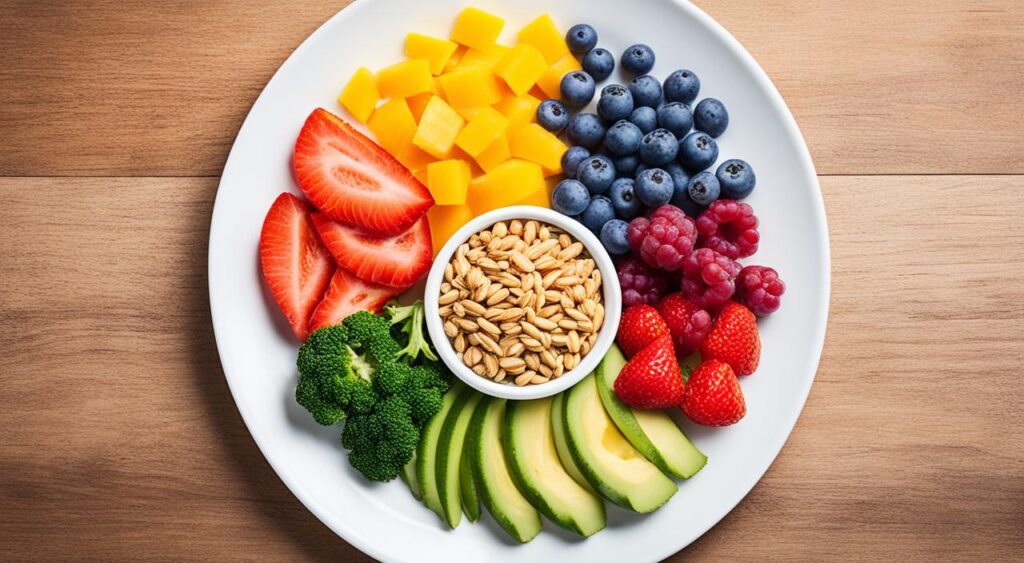Meal planning is a powerful tool for achieving a healthier lifestyle. By taking the time to strategize your meals, you can save valuable time, nourish your body with a balanced diet, and reduce stress associated with daily meal decisions. In this article, we’ll explore a range of practical and effective meal planning tips to help you transform your eating habits and unlock the benefits of healthy living.
Key Takeaways
- Meal planning can save you time and reduce stress in your daily routine
- A balanced meal plan provides essential nutrients for your health
- Batch cooking and meal prep make it easier to stick to your plan
- Incorporating variety and flexibility in your meal plan keeps it sustainable
- Overcoming obstacles like busy schedules or dietary restrictions is possible with the right strategies
The Importance of Meal Planning
Meal planning is a powerful tool that can significantly improve your overall health and well-being. By investing a little time to plan out your meals in advance, you can enjoy numerous benefits, including time savings on grocery shopping and meal preparation, as well as ensuring you and your family consume a more balanced and nutritious diet.
Time-Saving Benefits
When you have a plan in place, you can streamline your grocery shopping trips and minimize time spent in the kitchen. With a well-crafted meal plan, you’ll know exactly what ingredients you need, reducing the likelihood of making multiple trips to the store. Additionally, meal prep tasks like chopping, marinating, or cooking in bulk can be done in advance, allowing you to quickly assemble meals during the week.
Nutritional Advantages
Meal planning can also have a positive impact on your nutrition. By planning your meals ahead of time, you can ensure you’re incorporating a variety of nutrient-dense whole foods, such as fruits, vegetables, lean proteins, and whole grains. This can help you and your family maintain a balanced diet, supporting overall health and wellness.
| Benefits of Meal Planning | Time Management | Nutrition |
|---|---|---|
| Streamlined grocery shopping | Reduced time in the kitchen | Balanced, nutrient-dense meals |
| Efficient meal preparation | Fewer trips to the store | Variety of whole foods |
| Reduced food waste | Batch cooking and meal prep | Supporting overall health |
“Meal planning is the key to maintaining a healthy lifestyle. It allows you to take control of your nutrition and save time in the long run.”
Creating a Balanced Meal Plan
Constructing a balanced meal plan is essential for maintaining a healthy lifestyle. To ensure your meals provide the right mix of macronutrients (proteins, carbohydrates, and healthy fats), it’s important to consider portion sizes and the USDA’s dietary guidelines.
Start by dividing your plate into three equal sections: one for protein, one for carbohydrates, and one for fruits and vegetables. This simple portion control technique can help you create well-balanced meals that meet your daily nutritional needs.
When selecting your food groups, aim for a variety of nutrient-dense options. For example, choose lean proteins like grilled chicken or fish, complex carbohydrates like whole grains, and a colorful array of fresh produce. By incorporating a diverse range of macronutrients, you’ll ensure your body receives the essential nutrients it needs to function optimally.
| Macronutrient | Recommended Intake | Food Sources |
|---|---|---|
| Protein | 10-35% of total daily calories | Lean meats, poultry, fish, eggs, dairy, legumes |
| Carbohydrates | 45-65% of total daily calories | Whole grains, fruits, vegetables, legumes |
| Healthy Fats | 20-35% of total daily calories | Nuts, seeds, avocados, olive oil, fatty fish |
By following these guidelines and incorporating a variety of macronutrients into your meals, you’ll be well on your way to creating a balanced and nutritious meal plan.

Meal Planning Tips
Efficient meal planning is the key to maintaining a healthy lifestyle and saving time in the kitchen. One of the most crucial steps is creating a comprehensive grocery shopping list. By taking the time to plan your meals for the week and jotting down all the necessary ingredients, you can streamline your grocery trips and reduce the likelihood of impulse purchases or forgetting essential items.
Make a Grocery List
Before heading to the store, take a few minutes to review your weekly meal plan and write down all the ingredients you’ll need. Organizing your list by category, such as produce, proteins, and pantry items, can help you navigate the aisles more efficiently and avoid backtracking. Additionally, consider keeping a running grocery list throughout the week to note any items you may have forgotten or run out of.
Batch Cooking and Meal Prep
Another valuable meal prep strategy is to incorporate batch cooking and meal prepping into your routine. By dedicating a few hours on the weekend to prepare components for several meals, you can significantly reduce the time and effort required for time management and organization throughout the week. Whether it’s roasting a large batch of vegetables, cooking a large portion of grains, or pre-portioning protein sources, these simple steps can help you save time and ensure you have healthy, ready-to-go options on hand.
“Meal planning is the key to a healthier, more organized lifestyle. By taking the time to plan your meals and prepare ingredients in advance, you’ll save time, reduce stress, and nourish your body with wholesome, nutritious foods.”
Incorporating Variety and Flexibility
Meal planning doesn’t have to be a mundane task. In fact, incorporating recipe diversity and personalization can make it an enjoyable and rewarding experience. By trying new dishes and adjusting recipes to accommodate dietary restrictions, you can inject excitement and flexibility into your meal plan.
Trying New Recipes
Explore the world of recipe diversity by venturing beyond your usual go-to meals. Experiment with cuisines from different cultures, or put a creative spin on classic dishes. This not only introduces new flavors and textures to your diet but also keeps mealtime interesting and engaging.
- Discover international recipes that cater to your taste buds
- Reinvent familiar dishes with unique ingredients or preparation methods
- Embrace the joy of trying something new and expanding your culinary horizons
Adjusting for Dietary Needs
Accommodating dietary restrictions or personal preferences is essential for ensuring personalization in your meal plan. Whether you or a family member have specific dietary needs, such as gluten-free, vegan, or low-carb, you can easily adapt recipes to maintain a balanced and flexible menu.
- Identify the dietary needs or preferences you need to address
- Seek out recipes that naturally cater to those requirements
- Modify existing recipes by substituting ingredients or adjusting cooking methods
By embracing recipe diversity and personalization, you can create a meal plan that is not only nutritious but also enjoyable and tailored to your unique needs and preferences.

Overcoming Obstacles to Meal Planning
Meal planning can sometimes feel like a daunting task, especially when faced with busy schedules, picky eaters, or a lack of cooking experience. However, with the right strategies, you can overcome these common obstacles and establish a successful, sustainable meal planning routine.
Addressing Time Management Challenges
One of the primary challenges to meal planning is finding the time to do it. Between work, family responsibilities, and other commitments, it can be easy to let meal planning fall by the wayside. To combat this, try setting aside a dedicated time each week to plan your meals, such as Sunday evenings. This will help you stay organized and ensure that you have a plan in place for the week ahead.
Dealing with Picky Eaters
Picky eaters can make meal planning a real challenge. To overcome this obstacle, try involving your family in the process. Encourage them to share their favorite dishes or suggest new recipes to try. Additionally, consider offering a variety of options at mealtimes, allowing everyone to choose something they enjoy.
Boosting Motivation and Problem-Solving
Maintaining motivation and problem-solving skills are essential for successful meal planning. To stay motivated, celebrate your successes, no matter how small. When faced with a challenge, take a step back and analyze the situation objectively. Brainstorm potential solutions and be willing to try new approaches until you find a strategy that works for you.
By addressing these common obstacles, you can establish a meal planning routine that works for you and your family. With a little creativity and a commitment to problem-solving, you’ll be well on your way to enjoying the benefits of efficient meal planning.
Conclusion
In this article, we’ve explored the numerous benefits of implementing a comprehensive meal planning system. By taking the time to thoughtfully prepare your meals, you can unlock a world of time-saving conveniences, enhanced nutrition, and reduced stress around mealtimes.
The summary of key takeaways is clear: Meal planning empowers you to regain control over your diet, maximize the efficiency of your weekly routine, and ensure your body receives the essential nutrients it needs to thrive. Whether you’re a busy professional, a health-conscious individual, or a family juggling multiple schedules, adopting an effective meal planning strategy can make a profound difference in your overall well-being.
As you move forward, we encourage you to explore the wealth of resources available to help you refine your meal planning approach. From online meal planning tools to inspiring recipe blogs, the possibilities for continued growth and improvement are endless. By staying committed to this practice, you’ll not only reap the immediate benefits but also cultivate lasting habits that will support your health and lifestyle for years to come.

